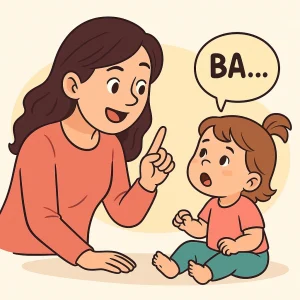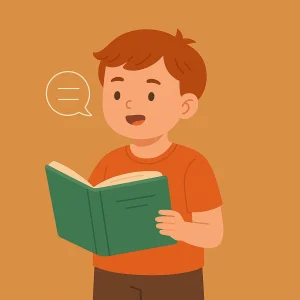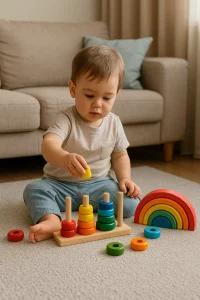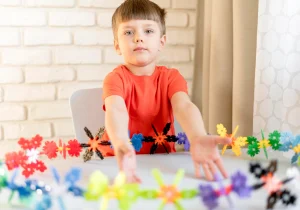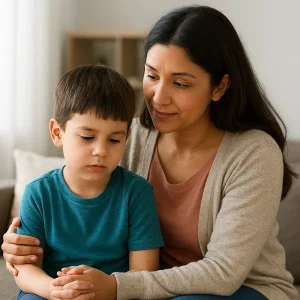Fun and Effective DIY Articulation Games with Household Items
By Rajini D
Last Updated: January 2, 2025
Articulation games are a fun and effective way to boost speech development in children. You don’t need specialized equipment—everyday household items can be transformed into engaging tools for speech therapy. From cups to cards, these common objects help keep children motivated while practicing pronunciation skills. Simple, engaging, and practical, these DIY games are perfect for anyone looking to enhance a child’s communication abilities at home.
Understanding Articulation Games
What are Articulation Games?
Articulation games are structured activities designed specifically to help individuals improve their ability to pronounce sounds correctly. These games are a core component of speech therapy, especially for children who have difficulties with speech clarity. By turning speech practice into a playful experience, these games help to reduce the monotony and stress that can sometimes be associated with regular speech drills. Articulation games involve repeating specific sounds, words, or sentences in a way that is both engaging and educational, aiding in the development of clearer and more precise speech.
Read More: Top 8 Engaging Articulation Games for Effective Speech Therapy
Benefits of Using DIY Articulation Games
DIY articulation games offer a host of educational and developmental benefits. They are particularly valuable for children as they transform learning into a fun and interactive process. Here are some key benefits:
- Cost-effectiveness: Utilizing household items to create articulation games eliminates the need for expensive therapy materials.
- Customization: Parents and therapists can tailor games to target specific sounds and speech issues relevant to the child’s needs.
- Increased engagement: Children are more likely to participate and stay focused when learning is fun and interactive.
- Flexibility: These games can be played anytime and anywhere, making speech practice more accessible.
- Family involvement: DIY games provide an opportunity for other family members to be involved in the child’s learning process, fostering a supportive environment for speech improvement.
Easy Articulation Games Using Household Items
1. The Magic Cup Game
Use plastic cups for a simple guessing game. Place three cups upside down, hide a small item under one, and shuffle them. Ask your child to guess where the item is, encouraging them to say a specific word or sound each time they guess. This game helps improve speech and attention skills.
2. Treasure Hunt Sounds
Create a home treasure hunt with items that start with the sound you’re focusing on, like ‘s‘ or ‘r‘. As your child finds each item, they should say the word out loud. This makes practicing speech sounds fun and engaging.
3. Build and Speak with Blocks
Write words or sounds on building blocks. As your child uses the blocks to build, they say the sound or word on each block. This combines speech practice with fine motor skills, making learning multifaceted and enjoyable.
DIY Articulation Games Setup
| Game Name | Materials Needed | Setup Instructions |
|---|---|---|
| The Magic Cup Game | Cups, small item | Place a small item like a marble or button under one of three cups. Arrange the cups in a line and shuffle them around while the child watches. Ask the child to guess which cup the item is under, encouraging them to articulate their guess clearly. |
| Treasure Hunt Sounds | Items with target sounds, clues | Select various objects around the house that include specific speech sounds your child needs to practice. Hide these items and create simple clues that lead to their location. As your child finds each item, they say the item’s name, emphasizing the target sound. |
| Build and Speak Blocks | Blocks, markers | Write different target words or sounds on the sides of several building blocks with a marker. As your child stacks the blocks to build a structure, they should say out loud the word or sound on each block they use. |
Know more: Simple Ways to Help Kids with Articulation Problems at Home
Creative Articulation Exercises for Kids
1. Articulation Bingo with Everyday Items
Make a bingo game using items that have the sounds your child is working on. Use pictures or words of items like “sock” or “soap” for the letter ‘s.’ Each time your child covers an item on their bingo card, they should say the word aloud. This makes learning fun and interactive.
2. Storytime Sounds
Use children’s books to practice speech sounds. Pick books with plenty of your child’s target sounds. Read together and pause for your child to say the words with the target sounds. This turns reading time into a fun speech practice session.
3. Sound Matching with Homemade Cards
Create memory matching cards with words that have the target speech sounds. Have your child flip two cards at a time to find a match, saying each word aloud. This game helps with both speech and memory skills.
Tips for Maximizing Effectiveness of Home Speech Therapy
Consistency is Key
- Set a Regular Schedule: Practice speech therapy activities daily to help make improvements more noticeable and sustainable.
- Short Sessions: Keep practice sessions brief but frequent to maintain focus and prevent fatigue.
Involving Family in Speech Practice
- Learn Together: Encourage all family members to learn the target sounds and participate in games.
- Supportive Environment: Create a supportive atmosphere where everyone helps in the child’s speech development.
Tracking Progress at Home
- Use Simple Tools: Keep a progress chart or a journal to note improvements and areas needing more focus.
- Adjust Strategies: Regular assessments allow for adjustments to the therapy plan based on the child’s progress.
Conclusion
We’ve shared some fun and simple articulation games using household items to help your child’s speech development. These activities are not just engaging but also incredibly effective. Try them out and see the improvement for yourself! For more activities and detailed guides, visit Wellness Hub. Your encouragement and participation can make a big difference in your child’s progress. Let’s make speech practice a rewarding and enjoyable part of their day!
Frequently Asked Questions:
1. What are articulation games?
Articulation games are fun and interactive activities that help children practice and improve their ability to pronounce words correctly. These games focus on encouraging children to repeat specific sounds, words, or phrases, making speech therapy engaging and less like a chore. They can be customized to target the sounds a child struggles with, making practice more direct and effective.
2. How often should my child play articulation games at home?
It’s recommended that children engage in articulation games daily. Consistency is crucial for speech improvement, so incorporating short, playful sessions multiple times throughout the day can help reinforce learning. Each session can be as brief as five to ten minutes, provided they focus on targeted practice.
3. Can articulation games really improve my child’s speech?
Yes, with regular and consistent use, articulation games can significantly improve a child’s speech clarity. These games make practicing speech sounds fun, which can motivate your child to engage more frequently and with greater enthusiasm, aiding in faster and more noticeable improvement.
4. What household items can I use for DIY articulation games?
You can use a variety of household items such as plastic cups for hiding and guessing games, building blocks for constructing and speaking, or even simple paper cards for memory games. These items can be easily incorporated into games that practice specific sounds, making them versatile tools in speech therapy.
5. Are these games suitable for all ages?
While these games are primarily designed for younger children, they can be adapted to suit older children as well. The key is to adjust the complexity of the game to match the child’s age and developmental level, ensuring the activities remain challenging yet achievable.
6. How do I make a bingo game for speech therapy at home?
To create a speech therapy bingo game, you’ll need to make or print bingo cards that feature images or words containing the target sounds. During the game, as each item is called out, your child will mark the item on their card and practice saying the word. This not only helps with sound articulation but also with word recognition and memory.
7. What is the best way to involve family in articulation practice?
Involving family members in articulation practice can be beneficial. Family can participate by playing articulation games together, offering positive reinforcement, and practicing target sounds during everyday interactions. This creates a supportive environment and reinforces learning outside of structured practice times.
8. How can I track my child’s progress in articulation?
Keeping a simple progress chart or journal can be very helpful. Note the sounds or words your child practices, track improvement, and identify areas that need more focus. Reviewing this journal with your child can also provide them with a sense of accomplishment and a clearer understanding of their progress.
9. Where can I find more articulation games and resources?
For a wider range of articulation games and resources, you can visit educational websites like Wellness Hub. These platforms often offer a variety of tools and materials that can help expand your home therapy sessions and provide new ideas for engaging your child.
10. Can these articulation games replace professional speech therapy?
While DIY articulation games are an excellent supplement to professional therapy, they are not a replacement for it. Professional speech therapists can provide tailored guidance and structured plans that address the specific needs of your child, which home games alone might not fully cover.
About the Author:
Rajini Darugupally
M.Sc., Speech-Language Pathologist (9+ years of experience)
Rajini is a passionate and dedicated Speech-Language Pathologist with over 9+ years of experience, specializing in both developmental speech and language disorders in children and rehabilitation in adults. Currently, at Wellness Hub, she thrives in a team environment that values innovation, compassion, and achieving results for their clients.
Book your Free Consultation Today
Parent/Caregiver Info:
Client’s Details:
* Error Message
